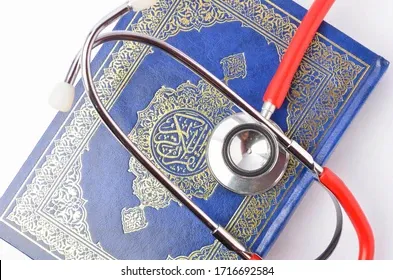Islam places a strong emphasis on health and well-being, viewing them as essential aspects of life. The Quran and Hadith (sayings of the Prophet Muhammad) encourage seeking medical treatment and taking care of one’s health. Here are some key points regarding Islamic rulings on health and medicine: The Prophet Muhammad (peace be upon him) encourages his followers to seek medical advice and utilize available resources for healing. Seeking medical treatment is seen as a natural means through which Allah provides healing, and it is considered a proactive step in taking care of one's health.
Ruling on medicine in Islam:
Father of medicine in Islam:
Mother of Medicine:
Lord of Medicine:
Islamic perspective on medicine:
Hadith of Medicine in Islam:
Role of Islam in medicine:
- Seeking Treatment:
It is encouraged to seek medical treatment for ailments. The Prophet
Muhammad said, "There is no disease that Allah has created, except
that He has also created its remedy."
- Preservation of Life:
Islam prioritizes the preservation of life. Medical interventions that
save or enhance life are highly valued.
- Prohibited Practices:
Certain practices are forbidden in Islam, such as those that harm the body
or involve unlawful substances. For example, the consumption of alcohol
and illegal drugs is prohibited.
- Holistic Approach:
Health is viewed holistically, encompassing physical, mental, and
spiritual well-being. Spiritual practices, such as prayer and fasting, are
seen as beneficial for overall health.
- Ethical Guidelines:
Medical practices must adhere to ethical principles. Informed consent,
respect for patient autonomy, and confidentiality are essential.
- Gender Considerations:
Some rulings pertain to gender interactions in healthcare, emphasizing
modesty and appropriateness in patient-caregiver relationships.
- Community Responsibility: Islam encourages the community to provide healthcare
and support for the sick and needy, reflecting a collective responsibility
for health.
Islamic teachings advocate for the
pursuit of health and the importance of medical care, while also emphasizing
ethical and spiritual dimensions of well-being.
Islamic rulings on health and
medicine are deeply rooted in the teachings of the Quran and the Hadith
(sayings and actions of the Prophet Muhammad). Here are some key aspects:
1.
Preservation of Life and Health
Islam places a high value on the
preservation of life and health. The Quran emphasizes that life is sacred, and
taking measures to maintain health is seen as a religious duty. Muslims are
encouraged to seek treatment for illnesses and to take care of their physical
well-being.
2.
Seeking Knowledge
Islam encourages seeking knowledge,
including medical knowledge. The Prophet Muhammad said, "Seeking knowledge
is an obligation upon every Muslim." This principle supports the pursuit
of medical education and advancements in healthcare.
3.
Ethical Medical Practices
Islamic ethics guide medical
practices, emphasizing compassion, honesty, and the dignity of patients.
Informed consent is important, and patients should be fully aware of their
treatment options. Physicians are encouraged to act in the best interest of
their patients.
4.
Prohibition of Harm
The principle of "do no
harm" is fundamental in Islamic medicine. Treatments that are harmful or
that violate ethical guidelines are prohibited. This includes practices like
euthanasia and unnecessary surgical procedures.
5.
Use of Permissible Substances
Islam has specific dietary laws
(halal) that influence medical treatments. For instance, any medication must be
free of haram (forbidden) substances, such as alcohol or pig-derived
ingredients. This impacts pharmaceutical development and the types of
treatments considered acceptable.
6.
Traditional and Modern Medicine
Islam acknowledges both traditional
medicine (like herbal remedies) and modern medical practices. Many scholars
advocate for a combination of both, recognizing the benefits of traditional
knowledge while embracing scientific advancements.
7.
Public Health and Community Responsibility
Islam promotes community health
initiatives and encourages individuals to take part in public health efforts.
Vaccination, hygiene, and preventive measures are often emphasized as communal
responsibilities.
8.
Mental Health
Islam recognizes the importance of
mental health alongside physical health. The teachings encourage seeking help
for mental health issues and provide guidance on coping mechanisms, such as
prayer and community support.
9.
End-of-Life Care
Islamic teachings provide guidance
on end-of-life care, emphasizing the importance of dignity and respect.
Palliative care and managing pain are important, and discussions around death
are approached with sensitivity.
10.
Islamic Medical Ethics Committees
Many Muslim-majority countries have
established ethics committees to address complex medical cases, ensuring that
treatments align with Islamic values while considering modern medical
standards.
Overall, Islamic rulings on health
and medicine reflect a holistic approach that integrates physical, mental, and
spiritual well-being, guiding individuals and healthcare providers in their
practices.
w

